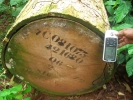 It seems a paradox, but it is true: after ten years of environmental campaigns and a tortuous legal path, an European law finally prohibits the illegal timber and put in place strong penalties to prevent abuses.
It seems a paradox, but it is true: after ten years of environmental campaigns and a tortuous legal path, an European law finally prohibits the illegal timber and put in place strong penalties to prevent abuses.
The European Parliament voted today in favour of the European directive to ban illegal timber from the European market. The law against illegal logging is a first step to save the world's forests, biodiversity and indigenous people's rights.
The directive is a compromise deal between representatives of the European Parliament and Commission. It contains strong and weak points, but if properly enforced, will have a huge positive impact on the world's forests and their inhabitants. It will also mean that developing countries will finally start benefiting from the revenues that, until now, have disappeared due to illegal trade.
The new law obligates operators to be transparent about the origin of their wood. Also, they have to assess the possibility of illegality and try to reduce the risk of selling illegal wood. All operators have to give information on where their timber is bought and sold. These measures will provide more transparency in the chain of trade and will reduce the risk of illegal timber appearing on the market.
Unfortunately, the law is undermined by a weak penalty system, based on a national level, and still to be defined, with no minimum penalties set on European level. This makes it possible for companies to move to countries with low penalties, and continue trading illegal timber.
The exception of printed products in the new law is also a missed opportunity, with 3.2 billion euros of import for books and printed products.
The environmental organisations will keep a close eye on the process of implementation of the law in the near future.


